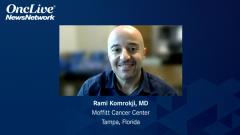
Oral Hypomethylating Agents in MDS: Data Updates
Amer Zeidan, MBBS, and Rami Komrokji, MD, discuss trial updates on oral hypomethylating agents, including data on dosing, for treatment of lower-risk MDS.
Episodes in this series

Transcript:
Amer Zeidan, MBBS: One other abstract that I’d add to those 3 big groups is the use of the oral hypomethylating agents, in particular ASTX727, or Inqovi. This drug has been approved in the United States for the same decitabine label, which is intermediate 1 and higher MDS [myelodysplastic syndrome] in the frontline setting. The dosage that was approved is 5 days of 35 mg of the drug. Decitabine and this agent is mixed with cedazuridine, which inhibits the enzyme cytidine deaminase and allows decitabine to be absorbed into the system with similar pharmacokinetics. Based on the ASCERTAIN study, this drug was approved in the United States.
There were 2 interesting presentations at ASH [American Society of Hematology Annual Meeting]. One was an update from the ASCERTAIN study—the phase 3 study that led to approval of the drug—looking at patients who had TP53 mutations, which is a bad indicator and predicts worse outcomes in most patients. In this analysis, it was interesting that patients who had TP53 mutations had relatively good survival, especially those who had biallelic mutations, which are the worst of those mutations. The median OS [overall survival] in those patients was 13 months, which was very surprising to many of us.
We have to note that this study accrued patients with not only higher-risk MDS—as defined by the IPSS [International Prognostic Scoring System], which is intermediate 2 and high—but also intermediate 1. Those patients could have longer survival. There could be some of that 13-month median OS that we see with TP53 patients with biallelic mutations, which could be driven by those patients. There was no breakdown by the IPSS provided on the impact of other mutations and the frequency of the complex karyotype among those with TP53 mutations. All of these are going to be important to determine if this is a factor of lower-risk patients or lower incidence of complex karyotype or if the oral version of decitabine has additional activity. It’s unlikely because I think of this drug as fairly similar to IV [intravenous] decitabine, but we’ll have to see that breakdown to be able to judge.
Another study looked at lower doses of this drug, and the idea is that azacitidine and decitabine at lower doses have been used in the United States. Although they aren’t approved in Europe, we’ve used them for patients with lower-risk MDS when we run out of other options and they continue to be transfusion dependent. Data led initially by [The University of Texas] MD Anderson [Cancer Center] and later validated in the Clinical Research Consortium have validated this approach of using 3 days of azacitidine or decitabine. Now we have the oral Inqovi—the oral formulation of decitabine—and the oral azacytidine—which isn’t approved in MDS—there has been interest in looking at different doses. There was an interesting presentation looking at lower doses of this drug, 10 mg rather than 35 mg, and it sounded like the transfusion dependence rate was quite good. This could mean that you could use this drug in patients with lower-risk MDS. Clearly, this needs to be studied more. This study is still ongoing, so what was presented was only phase 1 of that study.
Transcript edited for clarity.







































